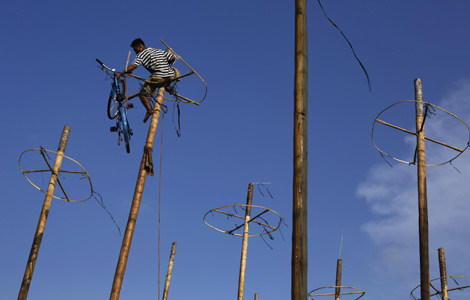Obama cancels Asia trip, in part
Updated: 2013-10-03 11:05
By Chen Weihua in Washington (China Daily)
|
||||||||
The partial shutdown of the federal government has put the US' pivot to Asia policy to task after President Barack Obama decided to cut short his upcoming trip to East Asia, according to US experts.
With no immediate compromise in sight between Republicans and Democrats in the Congress, Obama has canceled trips to Malaysia and the Philippines. The remaining trip, which will take him to Indonesia and Brunei respectively for the Asia Pacific Economic Cooperation (APEC) summit and East Asia Summit, is also likely to change, depending on the situation, according to the White House.
The previously scheduled trip to Malaysia would have been the first for a US president since Lyndon Johnson in 1966.
Ernest Bower, an expert on Southeast Asia at the Center for Strategic and International Studies, described the geopolitical ramifications of Obama not making the trip as big.
He said the immediate question people there will have is not whether President Obama is committed to the region, but whether the US system will allow a sustained political focus and political capital to be spent on what the administration itself described as pivot to Asia.
"And I think that will be put in a serious question," said Bower.
While Bower and some of his colleagues, such as Michael Green, described Obama's absence as a geopolitical gain for China, they emphasized that US cooperation with China in the region is still a dominant theme despite competition.
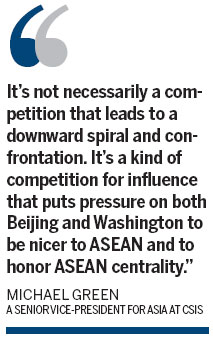
"Since 1971, the US policy in Asia has been based on cooperation with China. And every president since Nixon has, no matter what they said on the campaign trail, every president since Nixon has continued that line," said Michael Green, a senior vice-president for Asia at CSIS and an expert on Japan.
He pointed out that since the mid-1990s, the two countries have been trying to limit the other side's ability to stop their core interests.
"That is not containment," he said.
"I think cooperation remains the more dominant theme, but the reality is both sides are hedging and are trying to limit the other side's influence while avoiding confrontation," Green said.
Green echoed the words of senior US officials that the US cannot contain China in Asia because no ASEAN country wants to choose. "And China cannot stop the US in Asia because every Asian country, except maybe North Korea, wants the US in to maintain a healthy balance of power," he said.
Green believes that there is somewhat limited room for maneuvering for both Beijing and Washington, but both want to make sure that their core interests can be protected.
"It's not necessarily a competition that leads to a downward spiral and confrontation. It's a kind of competition for influence that puts pressure on both Beijing and Washington to be nicer to ASEAN and to honor ASEAN centrality," he said.
Chinese President Xi Jinping has already started his trip to Indonesia and a later trip to Malaysia.
Vikram Nehru, an expert on Asia at the Carnegie Endowment for International Peace, said the fortunes of China and ASEAN are inextricably interlinked and therefore it is imperative that every effort is made to foster good relations between them.
"Beijing neighbors with increasingly integrated economies, they have every reason to work jointly toward ensuring that mutually beneficial trade and investment is not slowed or halted by misunderstandings or unnecessary tensions," he said.
Nehru said China's presence in many ASEAN-related institutions allows frequent opportunities to address emerging security and economic issues before they become contentious.
He believes the launch of the negotiations of the Regional Comprehensive Economic Partnership (RCEP) is another avenue through which ASEAN and China can advance economic integration and improve their competitiveness in world markets.
chenweihua@chinadailyusa.com
(China Daily USA 10/03/2013 page1)
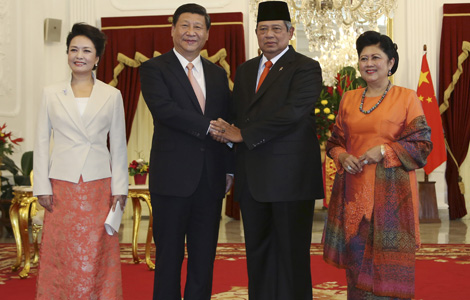
 Xi pledges to boost ties with Indonesia
Xi pledges to boost ties with Indonesia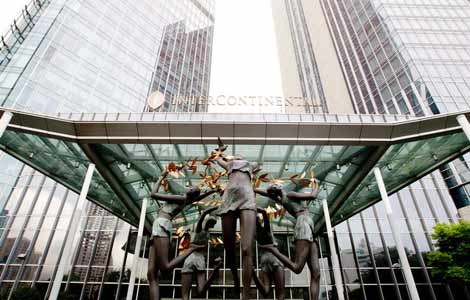
 Little room for growth among high-end hotels
Little room for growth among high-end hotels
 Diplomatic game
Diplomatic game
 The first place to be called the 'Middle Kingdom'
The first place to be called the 'Middle Kingdom'
 Lavish wedding ebbs under luxury ban
Lavish wedding ebbs under luxury ban
 Travel becomes passport to a new look
Travel becomes passport to a new look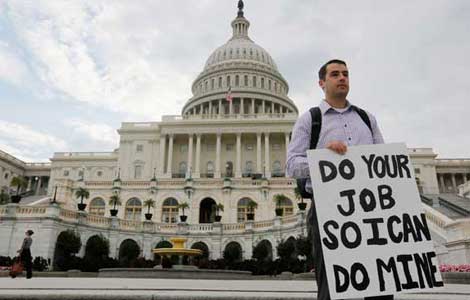
 Impasse in Congress shuts down services
Impasse in Congress shuts down services
 Li, Serena cruise on, Venus out at China Open
Li, Serena cruise on, Venus out at China Open
Most Viewed
Editor's Picks

|

|

|

|

|

|
Today's Top News
Obama, congressional leaders still deadlocked
Xi to address Indonesia's parliament
Russian embassy in Tripoli attacked
Iran has proposal for nuclear deal
The luxury of travel
US novelist Tom Clancy dies at 66
China, Indonesia renew currency swap deal
Obama cuts short Asia trip
US Weekly

|

|


